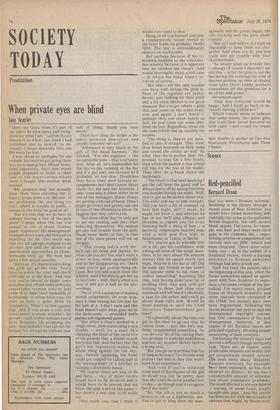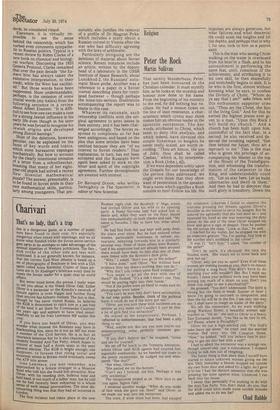Science
Red-pencilled
Bernard Dixon
Had you been a Russian scientist, browsing in the library through a recent issue of New Scientist, you would have ,found something substantially the same as the authentic British magazine, but with several blank spaces. The cover, for example, was bare and there were three gaps in the contents list representing articles on computers in the factory and on IBM, which had been censored. There were other holes, too as in the middle of a theatrical review, where a passing reference to Russian santizdat writings had been struck out.
Such has been the pattern since the beginning of this year, when the Societ authorities signed an agreement with New Scientist to reproduce a facsimile version of the periodical. For many years, pirated forms of Western scientific and other journals have circulated in the USSR, but matters have now been 'regularised,' following the Soviet decision laSt year to sign the international copyright convention. One consequence of the new arrangement, however, is that copies of the Russian issues are provided regularly, allowing proper monitoring of their contents.
Fathoming the censor's logic has proved a difficult though intriguing task. There are, of course, some predictable subjects and words that iare scrupulously erased. Articles Thi news items about 'dissident' Russian scientists, for example, 'Save been expunged, as has most material on defence. So too has a considerable amount of information about population problems. The word Marxist is always deleted leaving, in some cases, totally inexplicable gaps. And the censor has been severe with the occasional cartoon that might, by Soviet stan
dards, be considered risque. Elsewhere, it is virtually impossible to see the sense behind the censorship, which has curbed even comments sympathetic to Russian politics. Typical is a recent review by Robin Clarke of a new book on chemical and biological warfare. Discussing the 1925 Geneva Protocol, Clarke remarked that over the past decade "the Eastern bloc has always taken the extensive interpretation, to their credit, while the West has vacillated." But those words have been suppressed. More understandable, Perhaps, is the omission of some crucial words (my italics) from the following sentence in a review about Albert Einstein: "It is difficult to see how one can make a case for a strong Jewish influence in his early life even though in his later years he was forced to recognise his Jewish origins and developed strong Zionist leanings."
Most of the deletions, however Peculiar, can be explained on the basis of key words and topics, Which some bureaucrat expunges mechanically. But how to account for the clearly intentional omission of a letter from a schoolteacher, boasting that many of her eightyear-old pupils had solved a recent New Scientist mathematical Puzzle? The answer, presumably, is to be found in Soviet pride in their own mathematical skills, particularly among youngsters. That pre
sumably also justifies the removal of a profile of Dr Magnus Pyke, which includes a story about a Russian colonel in Vienna after the war who had difficulty agreeing with the laws of arithmetic.
Particularly intriguing are the deletions of material about Soviet science. Recent instances include an article, written by the deputy head of a laboratory in the USSR Institute of Space Research, about Lunokhod-2, the Russians' automatic Moon probe. Another was a reference to a paper in a Soviet journal describing plans for ventilated footwear though perhaps the none-too-serious illustration accompanying the report was to blame in this case.
Whatever its rationale, such censorship conflicts with the original agreement to print issues in their entirety, and it has been challenged accordingly. The Soviet response to complaints so far has been ambiguous, and based on the plea that some articles have been omitted because they are "of no interest to Soviet readers." That explanation, in turn, has not been accepted and the Russians have again been asked to stick to the letter and spirit of the copyright agreement. Further developments are awaited with interest....
Dr Bernard Dixon, who writes fortnightly in The Spectator. is editor of New Scientist.



































 Previous page
Previous page